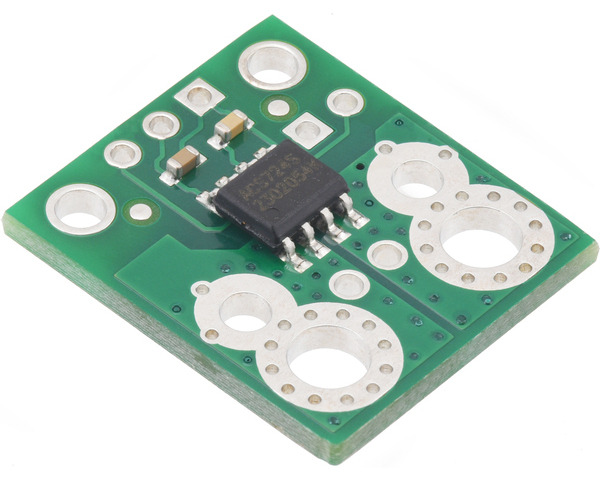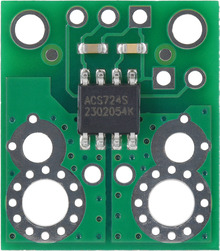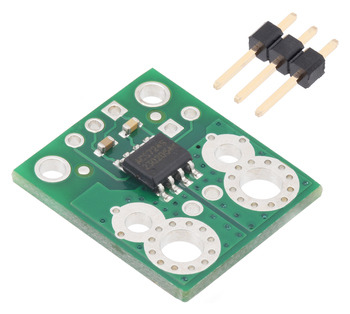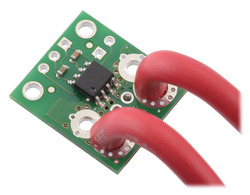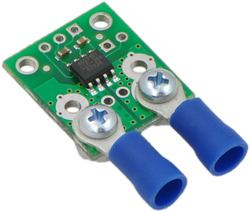Sensors » Current Sensors » ACS724 Current Sensor Carriers »
ACS724LLCTR-2P5AB Current Sensor Carrier -2.5A to +2.5A
This board is a simple compact carrier of Allegro’s ACS724LLCTR-2P5AB Hall effect-based, electrically isolated current sensor, which offers a low-resistance (~1.2 mΩ) current path and a high 120 kHz bandwidth for fast response times.
| Part Suffix | Range | Sensitivity @ 5 V | Zero Point @ 5 V | Supply Voltage |
|---|---|---|---|---|
| 2P5AB | ±2.5 A (bidirectional) | 800 mV/A | 2.5 V | 4.5 V to 5.5 V |
Alternatives available with variations in these parameter(s): current range Select variant…
| Description | Specs (10) | Pictures (9) | Resources (6) | FAQs (0) | On the blog (0) | Distributors (50) |
|---|
Overview
 |
 |
We are offering these breakout boards with support from Allegro Microsystems as an easy way to use or evaluate their ACS724LLCTR Hall effect-based, electrically isolated current sensors; we therefore recommend careful reading of the ACS724 datasheet before using this product. The following list details some of the sensor’s key features:
- Hall effect-based sensor with electrically isolated current path allows the sensor to be inserted anywhere along the current path and to be used in applications that require electrical isolation.
- Differential Hall sensing rejects common-mode fields, so the orientation of the sensor relative to uniform external magnetic fields (e.g. the Earth’s magnetic field) has less effect on the measurement.
- The conductive path internal resistance is typically 1.2 mΩ, and the PCB is made with 2-oz or 4-oz copper, depending on the sensor version, so very little power is lost in the module.
- High-bandwidth 120 kHz analog output voltage proportional to AC or DC currents.
- Typical 4 µs response time.
- Optional FILTER pin simplifies bandwidth limiting for better noise reduction and improved resolution at lower frequencies.
- Integrated digital temperature compensation circuitry allows for near closed loop accuracy over temperature in an open loop sensor.
- Automotive-grade operating temperature range of -40°C to 150°C.
- 0.7″×0.8″ carrier board offers a variety of ways to insert it into the current path along with 0.1″-pitch (breadboard-compatible) power, ground, and output pins.
- Unidirectional and bidirectional versions available.
The pads are labeled on the bottom silkscreen, as shown in the picture to the right. The silkscreen also shows the direction that is interpreted as positive current flow via the +i arrow.
A variety of options are available with different current sensing ranges and sensitivities:
| ACS724 Current Sensor Carriers | ||
|---|---|---|
| Sensitivity(1) | Unidirectional range | Bidirectional range |
| 800 mV/A | 0A to 5A | -2.5A to +2.5A |
| 400 mV/A | 0A to 10A | -5A to +5A |
| 200 mV/A | 0A to 20A | -10A to +10A |
| 133 mV/A | 0A to 30A | |
| 100 mV/A | -20A to +20A | |
| 66 mV/A | -30A to +30A | |
| 40 mV/A | -50A to +50A | |
| 1 Sensitivity shown for Vcc = 5V. | ||
Alternatives available with variations in these parameter(s): current range Select variant…
These versions all look very similar, and while you can distinguish them by reading the text on the IC, we also provide a white box on the bottom silkscreen where you can add your own distinguishing markings if so desired.
Details for item #4040
|
|
This carrier features the ACS724LLCTR-2P5AB, which operates at 5 V and is designed for bidirectional input current from -2.5 A to +2.5 A. This version can be visually distinguished from the other versions by the writing on the IC as shown in the pictures above.
| Part Suffix | Range | Sensitivity @ 5 V | Zero Point @ 5 V | Supply Voltage |
|---|---|---|---|---|
| 2P5AB | ±2.5 A (bidirectional) | 800 mV/A | 2.5 V | 4.5 V to 5.5 V |
When Vcc is 5 V, the output voltage is centered at 2.5 V and changes by 800 mV per amp of input current, with positive current increasing the output voltage and negative current decreasing the output voltage. More generally, the sensor’s zero point and sensitivity depend on VCC as follows:
``text(Zero Point) = V_"CC" / 2``
``text(Sensitivity) = 0.8 text(V)/text(A) * (1 + ((V_"CC" – 5 text(V)) * 1.3) / (5 text(V)))``
This board ships assembled with all surface mount components, and a 3×1 strip of 0.1″ header pins is included but not soldered in.
Using the sensor
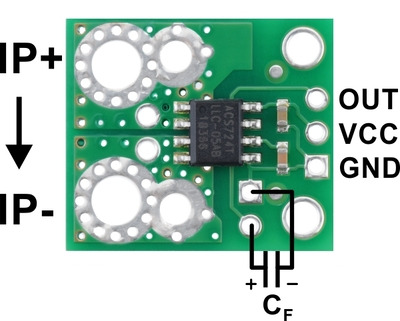 |
This sensor has five required connections: the input current (IP+ and IP-), logic power (VCC and GND), and the sensor output (VIOUT).
The sensor requires a supply voltage of 4.5 V to 5.5 V to be connected across the VCC and GND pads, which are labeled on the bottom silkscreen, and the sensor outputs an analog voltage with a linear relationship to the input current:
``V_"IOUT" = text(Zero Point) + text(Sensitivity) * I_"P"``
``I_"P" = (V_"IOUT" – text(Zero Point)) / text(Sensitivity)``
The FILTER pin lets you adjust the board’s bandwidth by adding a capacitor to ground (a ground pad has been added next to the FILTER pin for convenience) in parallel with the 1 nF capacitor that is already on the board. Without an added external filter capacitor, the bandwidth is about 90 kHz. The datasheet provides more information on how the filter capacitors affect bandwidth.
You can insert the board into your current path in a variety of ways. For low-current applications, you can solder 0.1″ male header pins to the board via the smallest pair of through-holes on the input-current side of the board. For higher-current applications, you can solder wires directly to the through-holes that best match your wires, or you can use solderless ring terminal connectors. The largest through-holes are big enough for 8 AWG wires or #6 or M3.5 screws, and the second-largest through-holes (and mounting holes) are sized for 12 AWG wires or #2 or M2 screws.
|
|
Warning: This product is intended for use below 30 V. Working with higher voltages can be extremely dangerous and should only be attempted by qualified individuals with appropriate equipment and experience.
Schematic and dimension diagrams
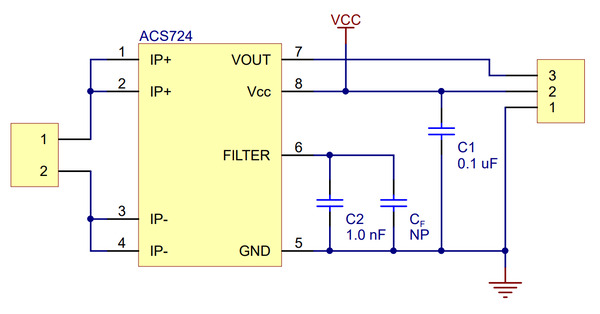 |
Schematic diagram of the ACS724 Current Sensor Carrier. |
|---|
The dimension diagram is available as a downloadable PDF (1MB pdf).
Comparison of the Pololu current sensor carriers
We have a variety of current sensors available with different ranges, sensitivities, and features. The table below summarizes our selection of active and preferred options:
 |
 |
 |
 |
 |
 |
 |
 |
|
|---|---|---|---|---|---|---|---|---|
| CT220 Contactless Current Sensor Carriers |
ACS3704x Current Sensor Micro Carriers |
ACS3704x Current Sensor Compact Carriers |
ACS711 Current Sensor Carriers |
ACS71240 Current Sensor Carriers |
ACS724 Current Sensor Carriers |
ACS37030 Current Sensor Compact Carriers |
ACS37220 Current Sensor Compact Carriers |
|
| Allegro Sensor | CT220xMV-HS5 | ACS3704x | ACS711KEXT | ACS71240 | ACS724LLCTR | ACS37220 | ACS37030 | |
| Sensing technology | XtremeSense™ TMR (tunneling magnetoresistance) |
Hall effect | Hall effect | Hall effect | Hall effect | Hall effect + inductive coil | Hall effect | |
| Logic voltage range | 2.7–5.5 V | 3.3V versions: 3.0–3.6 V 5V versions: 4.75–5.5 V |
3.0–5.5 V | 3.3V ver: 3.0–3.6 V 5V ver: 4.5–5.5 V |
4.5–5.5 V | 3.0–3.6 V | 3.3V ver: 3.15–3.45 V 5V ver: 4.5–5.5 V |
|
| Family current range | 10–800 A | 10–30 A | 15.5–31 A | 10–50 A | 2.5–50 A | 20–65 A | 100–200 A | |
| Range/sensitivity of individual versions | (2) ±1.5 mT / 1500 mV/mT ±15 mT / 150 mV/mT |
ACS37041: 3.3V Bidirectional: ±10 A / 132 mV/A ±30 A / 44 mV/A 5V Bidirectional: ±10 A / 200 mV/A ±30 A / 66.7 mV/A ACS37042: 3.3V Bidirectional: ±10 A / 132 mV/A ±30 A / 44 mV/A 5V Bidirectional: ±10 A / 200 mV/A ±30 A / 66.7 mV/A |
ACS37041: 3.3V Bidirectional: ±10 A / 132 mV/A ±30 A / 44 mV/A 5V Bidirectional: ±10 A / 200 mV/A ±30 A / 66.7 mV/A ACS37042: 3.3V Bidirectional: ±10 A / 132 mV/A ±30 A / 44 mV/A 5V Bidirectional: ±10 A / 200 mV/A ±30 A / 66.7 mV/A |
Bidirectional:(1) ±15.5 A / 90 mV/A ±31 A / 45 mV/A |
3.3V Bidirectional: ±10 A / 132 mV/A ±30 A / 44 mV/A ±50 A / 26.4 mV/A 5V Bidirectional: ±10 A / 200 mV/A ±30 A / 66 mV/A ±50 A / 40 mV/A 5V Unidirectional: 0–50 A / 80 mv/A |
5V Bidirectional:(2) ±2.5 A / 800 mV/A ±5 A / 400 mV/A ±10 A / 200 mV/A ±20 A / 100 mV/A ±30 A / 66 mV/A ±50 A / 40 mV/A 5V Unidirectional:(2) 0–5 A / 800 mv/A 0–10 A / 400 mv/A 0–20 A / 200 mv/A 0–30 A / 133 mV/A |
3.3V Bidirectional: ±20 A / 66 mV/A ±40 A / 33 mV/A ±65 A / 20.3 mV/A |
3.3V Bidirectional: ±100 A / 13.2 mV/A ±150 A / 8.8 mV/A 5V Bidirectional: ±100 A / 20 mV/A ±150 A / 13.3 mV/A ±200 A / 10 mV/A |
| IC current path resistance | N/A | 1.6 mΩ | 0.6 mΩ | 0.6 mΩ | 0.6 mΩ | 0.7 mΩ | 0.1 mΩ | |
| PCB | N/A | 2 layers, 1-oz copper |
2 layers, 2-oz copper |
2 layers, 2-oz copper |
2 layers, 2-oz copper |
2 layers, 2- or 4-oz copper(3) |
2 layers, 2-oz copper |
2 layers, 2-oz copper |
| Max bandwidth | 30 kHz | 150 kHz | 100 kHz | 120 kHz | 120 kHz(4) | 5 MHz | 150 kHz | |
| Size | 0.4″ × 0.62″ | 0.3″ × 0.4″ | 0.7″ × 0.8″ | 0.7″ × 0.8″ | 0.7″ × 0.8″ | 0.7″ × 0.8″ | 0.7″ × 0.8″ | 0.7″ × 0.8″ |
| Overcurrent fault output |
User-configurable threshold | |||||||
| Common-mode field rejection | ||||||||
| Nonratiometric output | ||||||||
| 1-piece price | $4.95 | $4.15 – $4.69 | $4.45 – $4.99 | $4.85 | $5.25 | $9.95 – $11.49 | $11.95 | $6.95 |
Note 1: Sensitivity when Vcc = 3.3 V; actual sensitivity is ratiometric (i.e. it is proportional to Vcc).
Note 2: Sensitivity when Vcc = 5 V; actual sensitivity is ratiometric (i.e. it is proportional to Vcc).
Note 3: 50A version of this carrier uses 4-oz copper PCB; all other versions of this carrier use 2-oz copper.
Note 4: Bandwidth can be reduced by adding a filter capacitor.
Note 1: Sensitivity when Vcc = 3.3 V; actual sensitivity is ratiometric (i.e. it is proportional to Vcc).
Note 2: Sensitivity when Vcc = 5 V; actual sensitivity is ratiometric (i.e. it is proportional to Vcc).
Note 3: 50A and higher versions of this carrier use a 4-layer PCB; all other versions of this carrier use a 2-layer PCB.
You can also use the following selection box to see these options sorted by current range:
Alternatives available with variations in these parameter(s): current range Select variant…
